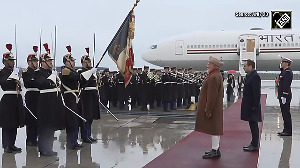We don't need reservations. We need to look beyond reservations' was the message sent out by Muslim community leaders who met in a seminar on 'Affirmative actions on Sachar Committee' organized recently by the National Economic Forum for Muslims, at the India Islamic Culture Centre in New Delhi.
Saiyid Hamid, chancellor of Jamia Hamdard University and former vice-chancellor of the Aligarh Muslim University, set the tone for the seminar with his remarks: "This is a rare opportunity which will not come again. The Muslim community must fully utilize it. The Sachar Committee report has told Muslims that you are more backward than the non-Muslim, Other Backward Classes of India. We have been officially told now that our place is nearer to Dalits."
The Muslim community leaders sent out a clear message that it was high time their fixation on defeating the Bharatiya Janata Party in elections should go.
Many leaders argued that as the elections got over, Muslims and their problems were forgotten. Their anti-BJP
stance is beneficial only for the party opposing the BJP and not to Muslims, they pointed out.
The depressing index of Muslim development proves that the community has been losing from both ends. The low level of education, employment and economic status shows that there is an urgent need to delink the community demands and a narrow agenda to defeat the BJP.
"Anti-BJP voting has proved costly for Muslims," conceded Iliyas Azmi, Bahujan Samaj Party's member of Parliament from Shahabad in Uttar Pradesh.
Chief guest and former prime minister V P Singh, elaborating on vote-bank politics, told the seminar, "The time has come for Muslims to become bank managers and not to be the vote-bank of so-called secular political parties. Muslims are always frightened by the secular parties of the BJP, and their votes are robbed out of fear. The time has come for Muslims to choose who will deliver for them, and not who can necessarily defeat the BJP. By having 'defeat BJP' as the only political aim Muslims have suffered a lot."
The Sachar Committee report into the status of Indian Muslims, and the ensuing controversies over its findings have changed the internal debate within the community..
The Sachar Committee report which highlights the gloomy progress of Muslims in India in the last 60 years has raised the community's hopes sky-high. Popular columns in Urdu newspapers, television debates and community-level discussions suggests that these expectation are from the government and also the majority community.
Specifically, there is a lot of expectations from Congress president Sonia Gandhi the United Progressive Alliance government.
Kamal Farooqui, a mover behind the seminar, told rediff.com, "Thanks to the changing times we are able to raise our voice. Because of the Sachar Committee report we are determined to challenge Article 341 of the Constitution which is discriminatory and communal."
Farooqui also asked of his community, "Don't we need to look above reservations? Why do we need subsidy to go on Haj?"
"Without becoming emotional we must take up the task of development of Muslims in a professional manner," he argued.
Some of the facts and figures from the report have stunned Muslims themselves, too.
Like, only three per cent of the school-going children go to madrassas. Some 70 per cent of the Muslim population lives in 100 districts of India.
Farooqui said, "This time Muslims have decided to not become emotional. Muslims wants to be wiser by not becoming
reactionary."
Educated Muslim leaders are trying to not make the Sachar Committee report an emotional issue, but want to use it to uplift the community.
Zafar Mehmood, officer on special duty on the Sachar panel, said, "For the first time in India such an exercise was executed. For the first time not minorities but Muslims alone were kept in focus. For the first time the paper work was done keeping Muslims in mind. The figures concerning Muslims which were not available in the Census or in National Statistical Surveys are now available because of the Sachar report."
He said Muslims should also look within. The Sachar Committee report shows that Muslim employment was disproportionate to their 13.5 per cent population but, Mehmood pointed out, once the police recruitment was over the committee members found that of the total recruitment only three per cent were Muslims. On further inquiry, it was found that out of the total applicants for police jobs only two per cent were Muslims!
He said India needed a National Data bank and an Equal Opportunity Commission to help the cause of minorities.
Rahman Khan, deputy chairman of the Rajya Sabha said, "Muslims should not wait for the government to implement Sachar's findings, some programmes can be taken up right away for their economic and educational development by educational bodies, non-governmental organizations which can work at the grass-roots level." He said Muslims need to find a mechanism to channelise the $50 billion contribution to Indian GDP by Muslims.
First time, the seminar also saw Muslims talking about helping themselves through private money.
There are four lakh properties all over India owned by the Waqf Board, 43 properties of them in New Delhi which are
valued above Rs 5000 crore. Now, the Muslim community thinks that instead of waiting for government funding they need new avenues to fund community activities.
Azmi even questioned the UPA government's political will. He said, "I don't trust the intentions of the government.
Remember, Pranab Mukherjee as defence minister did not allow the Sachar Committee to count Muslim representation in Indian army. At the time of independence Brahmins made up four per cent in the top level of government service but it became 70 per cent. In the name of secularism Mulayam Singh Yadav has won many elections but it is also a fact that Yadavs who were just one per cent of the police force [before Mulayam came to power] have now increased to above 25 per cent."
He warned that Muslims should not demand reservations in such a manner that the ruling party which is in a position to give, gets embarrassed into not giving even what is legitimate.
He eloquently said, "In the BJP's name, our secular friends have obliterated us! How mindlessly we gave tonnes of votes against the BJP."
"Muslims should now ensure that there is no strong one-party government at the Centre."
Syed Shahabuddin, former MP and campaigner against the Ram Janambhoomi movement advocated 11-12 per cent reservation for Muslims. He said after the Sachar Committee report the work for Muslim leaders and communities was cut out. The Supreme Court has put a cap on total reservations, so how do Muslims cross that limit to get their share of reservation is the big challenge.
He also said "the Hindu reaction " can be expected if Muslims ask for their share so the issue of reservation should
be raised tactfully.
V P Singh announced that if his newly-floated regional party the Jan Morcha came to power in Uttar Pradesh, "the first decision of the Cabinet within one hour of government formation will be to bifurcate the 27 per cent Other Backward Classes quota among advanced OBCs, the Hindu Most Backward Classes and Muslim backward classes in proportion to their population."
Singh also called upon the central government "to abrogate forthwith Article 341, the only communal clause in the
Constitution, which bars Muslims and Christians from getting reservations available to Schedule Castes and Tribes because of their religion."
The Sachar Committee report has revived the debate on Article 341. Muslim leaders argued that Article 15 of the Constitution bars discrimination on grounds of religion, race, caste, sex or place of birth. Since long Christian and Muslim Dalits have argued that while the Constitution stands for equality before law, contrary to its spirit a discriminatory provision in Article 341 was included through a Presidential Order in 1950.
Article 341 says the President or State after consultation with the governor has the right to specify the castes, races or tribes under Scheduled Castes and Tribes but it also mentions that only Hindus are entitled under this provision. Most Muslims and Christians contend that this is a direct assault on religious freedom.
This Article was amended first in 1956 to bring neo-Sikhs and in 1990 to bring neo-Buddhists under its purview. After
the Sachar Committee findings Dalit Muslims say they should be included through an executive order so they have the benefit of reservations enjoyed by Dalits and tribals.
The Manmohan Singh government has launched a 15-point programme for upliftment of Muslims but it has remained
ineffective.
M J Khan, the seminar's convenor, said, "The words of encouragement, support, free books and 15-point programmes etc are only an eye-wash, and cannot do any justice to their participation in economic spheres."
The issues of minority rights, obligations of the State, and the mindset of the majority came in for sharp focus.
After a long debate the Muslim Economic Forum came out with a five-point resolution which mirrors the opinion of a
section of Muslims over the Sachar Committee report.
1. The discrimination meted out to Muslims under Article 341 must be revoked and Dalit Muslims be entitled to the same benefits as other SCs/STs.
2. The OBC quota should be bifurcated among Advanced OBCs, Most Backward Classes and Muslims for a just and fair share to all the three sub-groups. "The Constitution does not stop bifurcating the OBC reservation to help Muslims. It will test the honesty of the Congress-led government," said V P Singh.
3. 15 per cent share for Muslims in all government and Public Sector Unit schemes, allocations, dealerships etc.
Mandatory 15 per cent bank credit under Priority Lending.
4. 15 per cent quota in all government-owned, aided, registered and recognised private educational institutions at
all levels, or one-time allocation of Rs 100,000 crores in the Ninth Plan for building 1,000 Muslim educational
institutions of 1,000-student capacity each.
5. Support in skills upgradation and certification through the launch of a massive programme upto the block level by the
ministry of labour and employment with allocation of Rs 3500 crores for Muslim entrepreneurship training, skills upgradation and certification by launching up to tehsil level programs.
Besides these demands, some experts recommended that all madrassas in India have uniform exams and the new madrassas board should have exclusive syllabus.
P A Inamdar, chancellor of Jamia Milia University said, "There is an urgent need to unite South Indian Muslims with
North Indian Muslims. New Delhi-based Muslims should play a role in it."
"Muslims in North India thought their problems will be solved through politics while South Indian Muslims went on with focus on education. The end result is that North Indian Muslims have remained backward. Muslims in North India should stay away from politics for the next 20 years. They should think how best we can use modern technology and help our small artisans and poor people," Inamdar said.






 © 2025
© 2025